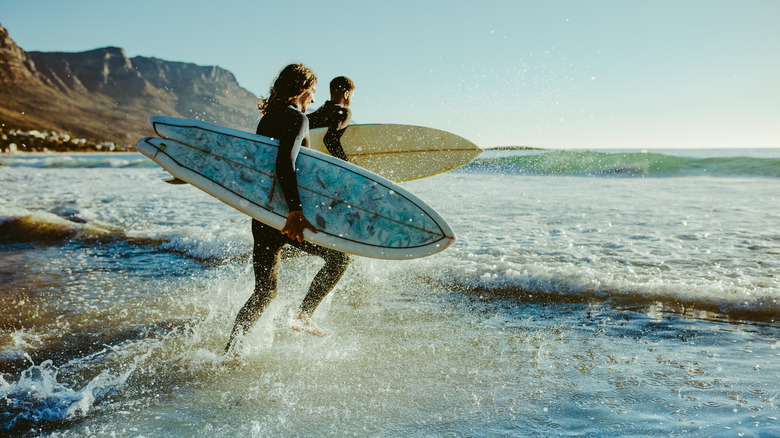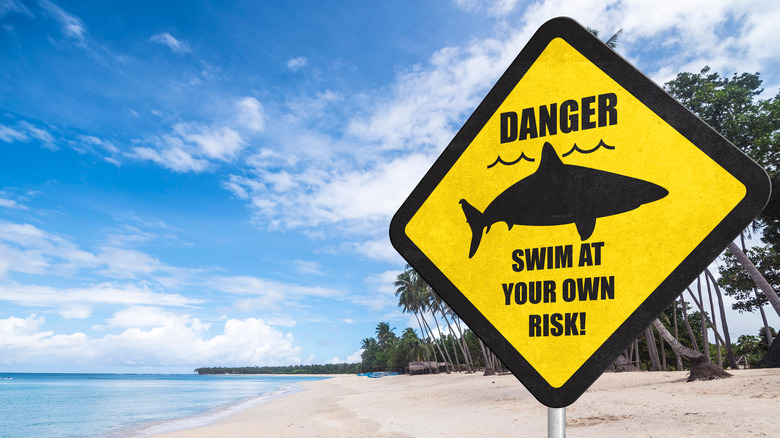What To Do If You're Attacked By A Shark
Being struck by lighting, crushed by a vending machine, having a coconut fall on your head, and being attacked by a shark are all things that you have probably feared of dying from at some point. All of these incidents have one thing in common: They are extremely unlikely to occur. Despite the slim chance that any of these could happen to you, it never hurts to be prepared.
There are more than 500 species of shark, says Smithsonian, ranging in size from the dwarf lantern shark (about eight inches long) to the whale shark (about 39 feet long, but harmless to humans). How Stuff Works says that only three of those species tend to be a danger to humans: the great white, tiger, and bull sharks. Being prepared is especially important in the case of a shark attack. While it may not seem like there is much you can do once a shark attack occurs, there are things you can do to minimize your chances of being attacked in the first place (via Florida Panhandle). The steps you take during and immediately following a shark attack can also drastically improve your chances of survival.
You most likely won't be attacked by a shark
Media headlines love to mention shark attacks whenever they can, but these events are actually incredibly rare. On average, there are only about 100 unprovoked shark attacks worldwide every year (via Florida Panhandle). In fact, the idea that sharks frequently attack humans is just one of the many myths about sharks that you may have heard. The reason this myth is so prevalent may be due to the crazy survival stories that are frequently spread around online and by the news.
Not only are shark attacks, but deaths caused by shark attacks are even rarer. The odds of being attacked and killed by a shark are 1 in 3.7 million, or about 0.000026%. In 2021, there were only 11 shark-attack-related deaths. In fact, you are more likely to be killed in a fireworks accident than by a shark (via Surfer Today).
Why do sharks attack people?
There is no evidence that sharks intentionally hunt people, so why do they even attack us in the first place? The first thing to understand about sharks is that they are curious, and they have big jaws. During the average shark attack, the shark is probably not intentionally attacking you (via Florida Panhandle). The problem is a shark's big mouth, where a little nibble can result in a missing limb on a human being.
When sharks attack, it is usually out of confusion or curiosity. Sharks sometimes confuse humans with their normal oceanic prey. When this happens, sharks usually stop attacking once they realize that a person is not, in fact, their favorite food. Sometimes a shark will attack out of curiosity, trying to see if it is worth eating a human. The answer is usually no, in which case they will leave you alone after taking out a bite (via Britannica).
Be aware before getting in the water
Before you step foot into the ocean, it is important of being aware of a couple of tips that can help you avoid a shark attack. First, no matter what, you should always swim in a group. Swimming with others can not only ensure you get medical attention should an attack actually occur, but is also an important part of safe swimming. Being part of a group can also increase the chances that someone spots a shark before it attacks.
When you get into the water, don't swim too far away from the shore. The time of day when you swim is also important. Avoid the ocean at night, dawn, and dusk. Many types of sharks love to come out during these times, and the reduced visibility will make it harder to see one coming. Don't wear shiny jewelry while you swim, and be careful to avoid water where people are fishing, as these can both attract curious sharks (via the Florida Museum).
Pay attention while you're in the water
Once you're in the water, pay attention to your surroundings. Try not to splash around too much, and don't bring pets into the water. Erratic splashing can confuse sharks, making them think that a tasty snack is nearby (via the Florida Museum). Pay attention to warnings that might be posted in the area. These flags can alert you to sharks and other dangerous sea life, such as jellyfish.
While you're enjoying your swim, be extra careful near sandbars and steep drop-offs, as sharks tend to hang out near these areas. Do not urinate in the water, as this can attract sharks. If you cut yourself while hanging out in the ocean, get out of the water as soon as possible. Sharks have an exceptional sense of smell, so even a couple of drops of blood can cause one of these hungry predators to come investigate (via Two Oceans Aquarium).
If you're attacked by a shark
How Stuff Works advises that if you see a shark circling, that means it's getting ready to attack. Stay still; it might leave you alone. If it does attack, however, playing dead won't help; the shark will think it's won and will begin dining.
If you are attacked by a shark, your reaction can be the difference between life and death. Maintain eye contact and fight back with a hard object like a paddle. If you don't have anything with you, use your fist to punch. The gills and eyes are especially vulnerable parts of the shark. Position yourself in a way that protects your head and neck from being bit.
As soon as you can, get out of the water. While you're exiting the water, don't turn your back on the shark and don't thrash around. A shark can and will outswim you if it thinks you would make a good meal. Once you're out of the water, seek immediate medical attention if you've been injured. Have someone apply pressure to your wounds to control the bleeding. The sooner you get help, the better chances you have of survival (via Florida Panhandle).





